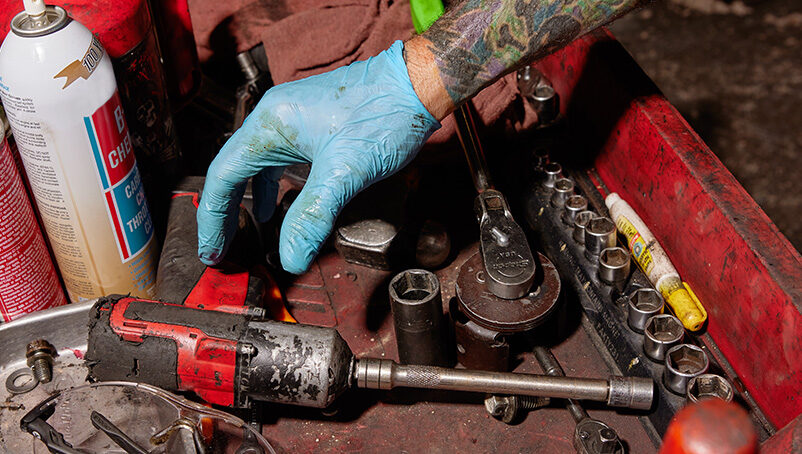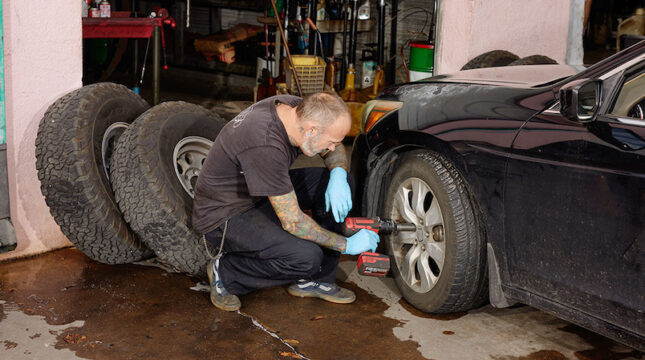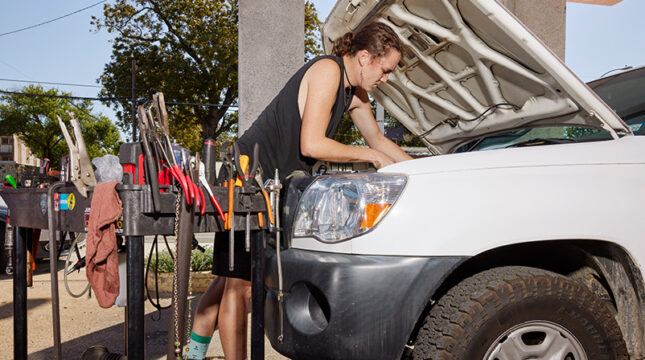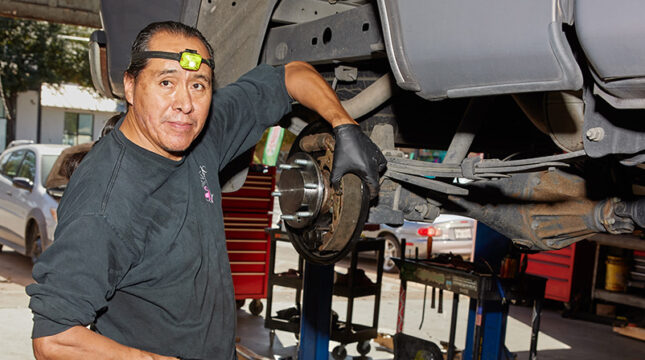Do you need a Michigan mechanic license to perform work in the state?
You must have the proper state-issued certification to perform motor vehicle repairs for compensation in Michigan. According to the Secretary of State, “motor vehicle repairs” applies to any work involving the “reconditioning, replacement, diagnosis, adjustment or alteration of the operating condition of the vehicle or any component or sub-assembly.”
Michigan mechanic licensing categories
The state offers four certifications for auto mechanics who work on regular cars and trucks:
- Specialty Mechanic: Certified in one or more but not all of the repair categories for the automobile/light truck repair or heavy-duty truck repair classifications.
- Master Automobile Mechanic: Certified in the first eight categories under automobile/light åtruck repair classification.
- Master Heavy-duty Truck Mechanic: Certified in all six categories under heavy-duty truck repair classification.
- Master Motorcycle Mechanic: Certified in the motorcycle repair classification.
Michigan offers repair categories that focus on specific areas of a vehicle:
- Automobile & Light Truck: Engine repair, automatic transmission, manual transmission, front & rear drive axles, front end, suspension & steering systems, brakes & braking systems, electrical systems heating & air conditioning, engine tune-up/performance, unitized body & structural repair, collision-related mechanical repair, breath alcohol ignition interlock device (BAIID)
- Heavy-Duty Truck (HDT): Engine repair – gasoline, engine repair – diesel, drive train, brakes & braking systems, suspension & steering systems, electrical systems
- Miscellaneous: Motorcycle repair, recreational trailer
Michigan mechanic trainee permits
Mechanics still gaining the experience and training necessary for certification may apply for a mechanic trainee permit. To qualify for this permit, you must work at a repair facility under the direct supervision of a certified mechanic.
When submitting your trainee permit application, choose from the certification categories listed above. Your supervisor must be certified in any categories you apply for.
You’ll need to include a $20 permit fee with your application. No permit fee is required if you are already state-certified in other repair categories.
Trainee permits expire after two years and may not be renewed or reissued. If you have not obtained certification by the time your permit expires, you must stop working in those repair categories.
Insurance requirements for a Michigan mechanic license
If you plan to open your own business, in addition to your car mechanic license, you’ll also need the right auto mechanic insurance. The following list features the top types of insurance recommended for individuals with a certified mechanic license in Michigan.
Workers’ Compensation insurance
You must have workers’ compensation insurance if you plan to have employees. In Michigan, it’s required for all private employers who regularly employ one or more employees 35+ hours per week for 13 weeks or longer or all private employers who employ three or more employees.
This coverage can help cover costs related to workplace injuries and work-related illnesses. It can help cover things like lost pay and medical expenses.
General Liability insurance
With general liability insurance, you’ll have coverage that helps cover your business from accidents, such as property damage to someone else’s property or the medical expenses around injury to non-employees like clients. It can also help protect against personal and advertising injuries.
Commercial Property insurance
Commercial property insurance provides essential mechanic shop insurance coverage. It helps cover expenses if certain damage, such as a break-in or a fire, occurs at your auto repair shop.
If your shop is certified, you can save up to 19% when you bundle general liability with commercial property coverage with NEXT. Qualifying certifications are ASE, I-CAR (Gold class) and AAA-approved auto repair.
Garagekeepers coverage
This specific type of liability coverage is highly recommended for auto service business owners. Garagekeepers coverage applies to accidental damage to vehicles serviced or stored at your facility.
Faulty Work insurance
If you make professional mistakes or the customer finds your work substandard, faulty work coverage helps defend you against the claim.
Hired & Non-Owned Auto insurance
Also known as HNOA insurance, this provides coverage when an employee drives a customer’s vehicle off your lot or uses a personal vehicle for work.
Michigan mechanic license requirements
You do not need to meet any work experience requirements to become a certified automotive service technician in MI. However, your application will require the following information:
- Number of months of vehicle mechanic education or training you have received
- Number of years you have been employed as a vehicle mechanic
- Any states/jurisdictions where you have a mechanic license or certification
- Arrests of convictions on your record within the past 10 years
You aren’t required to have a high school diploma or GED to become certified, but many training programs and employers prefer it. Many aspiring mechanics attend technical schools or community colleges to gain the hands-on skills and knowledge to pass certification.
In addition, you must pay an application fee of $25 by check or money order. This is a single application fee that covers multiple categories if you decide to apply for more than one at once.
How to get a mechanic license in Michigan
You must pass a test before you can apply for Michigan mechanic certification. A separate test is administered for each certification category.
After you pass your test(s), the state will mail you a detailed test result letter. You must fill out and submit the enclosed application to receive your certification.
Michigan mechanic license test
You must pre-register for Michigan mechanic’s tests in each certification category you intend to apply for. You’ll need to create an account online to pre-register, which costs $6 per test.
You may take your test(s) at any Secretary of State office in the state within 60 days of pre-registering. Automotive schools also provide testing for their students. Tests are administered electronically via touch screen kiosks. Bring a printed copy of your mechanic payment receipt with your test ID number along with a driver’s license or state ID.
The kiosk will display your pass/fail results on the screen. The certification exams use a “Quick Pass” system, which means that the test ends as soon as you receive the required minimum score to pass.
If you fail the test, you may re-register and take it another day. You must pay the $6 test fee for each retake test.
Michigan mechanic license reciprocity
The state of Michigan allows applicants to transfer National Institute for Automotive Service Excellence (ASE) certification in select categories for mechanic licenses. Michigan mechanics with approved ASE credentials will not have to take the certification test in that category.
Accepted ASE certifications that qualify for transfer to Michigan certification:
- A1: Engine repair
- A2: Automatic transmission/transaxle
- A3: Manual drivetrain and axles
- A4: Suspension and steering
- A5: Brakes
- A6: Electrical/electronic systems
- A7: Heating and air-conditioning
- A8: Engine performance
- LI: Advanced engine performance specialist
- T1: Gasoline engines (heavy-duty truck)
- T2: Diesel engines (heavy-duty truck)
- T3: Drive train (heavy-duty truck)
- T4: Brakes (heavy-duty truck)
- T5: Suspension & steering (heavy-duty truck)
- T6: Electrical/electronic systems (heavy-duty truck)
- B3: Non-structural analysis and damage repair
- B4: Structural analysis and damage repair
To submit your ASE credentials, log in to your myASE account and click on “Send Status Letter.” Then, enter the email address Licensing@Michigan.gov to have proof of certification submitted directly to the state’s Business Licensing Section.
Michigan mechanic license renewal
You must renew Michigan mechanic certifications annually online or by mail. In addition, special recertification requirements apply for the following certification categories:
- Engine tune-up/performance
- Brakes and braking systems
- Electrical systems
These certifications expire after five years; at this point, you must either retake the certification test or provide proof of current ASE certification in a corresponding category.






